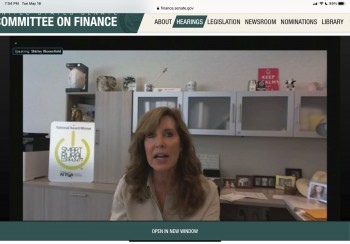This week has been exciting in the opportunities that NTCA-The Rural Broadband Association has had in sharing our timely thoughts on broadband deployment with Congress. The ability to catch our collective breaths and share some thoughtful reaction on the importance of future-proof, affordable broadband for rural Americans and the role of federal infrastructure investment could not have come at a better time.
I was honored to provide the perspective of broadband operators in testifying before a Senate Finance Committee hearing on infrastructure funding, and Lang Zimmerman, vice president of NTCA member Yelcot Telephone Company (Mountain Home, Ark.), testified before a House Appropriations Committee Subcommittee on Financial Services and General Government hearing on how lessons from the pandemic should inform broadband policy going forward.
The rural broadband industry and our nation as a whole have a great story of success to date in delivering high-speed broadband services, and that certainly has never been more important than over the last 15 months. But we still have much more work to do both in deploying networks and delivering robust and affordable services for millions of Americans, and this is where public policy can play a really important role in helping build and sustain broadband in rural markets that are otherwise not able to justify these kinds of investments.
I was able to take the opportunity to specifically recommend that any broadband infrastructure plan needs to aim to build and maintain lasting networks using future-proof technology such as fiber, coordinate among existing and new federal broadband programs, include clear service standards for providers to participate, leverage the expertise and experience of community-based providers and address barriers to broadband deployment such as permitting and supply chain delays.
In his testimony, Zimmerman said, “The pandemic has altered society as we know it and highlighted the importance of access to reliable, high-speed broadband connectivity. If I had to identify one lesson learned from the pandemic, it would be that investments in broadband infrastructure and affordability are essential so that everyone will experience the telehealth, telework, distance learning and other benefits of such connectivity.”
While I was the only broadband witness before the Senate Finance Committee, I was struck by how many similarities there are between transportation policy and broadband. Fitting I suppose given that I really do think that broadband is the equivalent of the 21st Century Superhighways. For example, when Senator Stabenow from Michigan commented on how large users of highways should pay their share of the freight, all I could think of was USF contributions reform and how those who make their business models from services brought to rural Americans should and could help pick up the freight of carrying their traffic. When Senator Carper asked each of us to share what “bridge” we see as essential in the future, all I could see was the “digital” bridge that will continue to bring these essential services to all Americans.
Mostly, I was delighted at the bipartisan belief across the committee that broadband is truly the tool that has defied all odds to keep the American economy humming over the past 15 months and that the real question is how to ensure that these investments are made to be future-proof and sustainable into the future.
Added bonus of this continued “virtual” world? This is the first time I was able to testify before a Senate committee with my shoes off!


